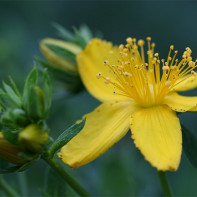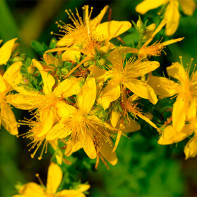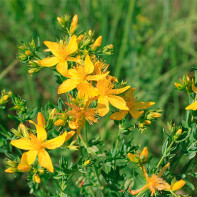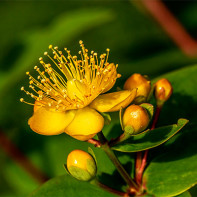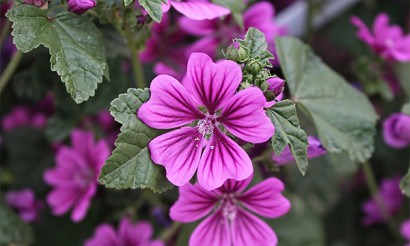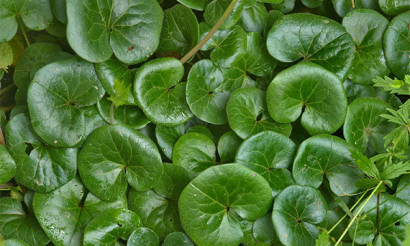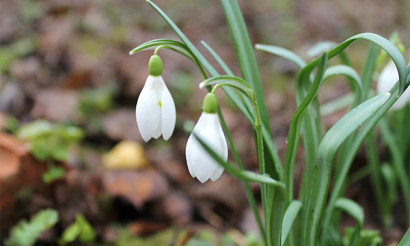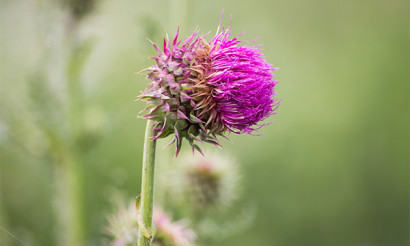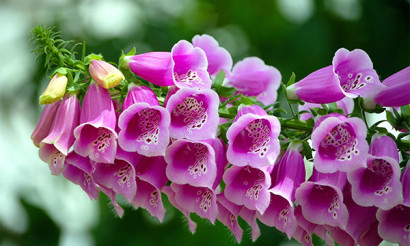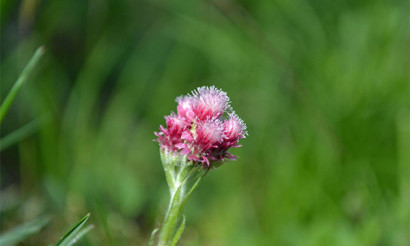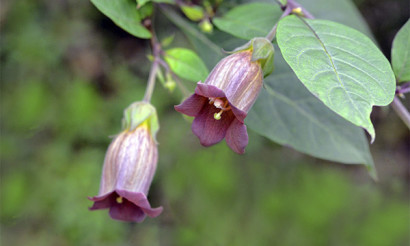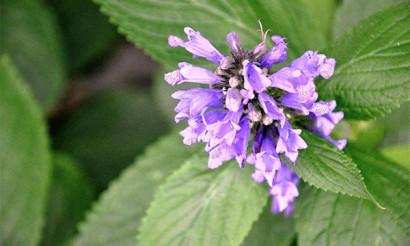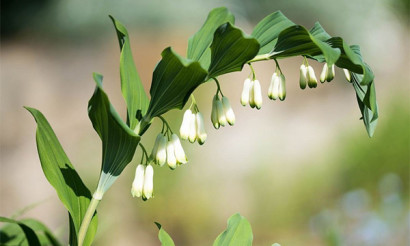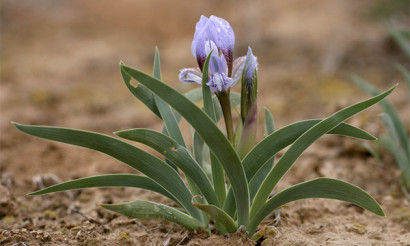St. John's wort: therapeutic properties and contraindications
In folk medicine and cosmetology, many different herbs are used. One of the most popular is St. John's wort. On its basis prepare infusions, decoctions and even tea. All of them help to cope with unpleasant symptoms and improve health.
- Chemical composition
- How it looks and where it grows
- Types of
- Gathering and storage
- Therapeutic properties of the herb St. John's wort
- For Women
- For Men
- In Pregnancy
- When breastfeeding
- For kids
- When losing weight
- St. John's wort oil: properties and uses
- St. John's wort in medicine
- Diabetes mellitus
- In pancreatitis
- For gastritis
- For intestines
- For constipation
- For gout
- For colitis
- For the liver
- For hemorrhoids
- For cholecystitis
- Vitiligo
- For maxillary sinusitis.
- For Alcoholism
- From depression
- For colds
- For menopause
- From cystitis
- For worms
- St. John's wort increases or decreases blood pressure
- Types of medicinal compositions with St. John's wort
- Infusion
- Infusion
- Decoction
- Tea
- Cosmetic applications
- Tincture for acne
- Decoction for oily skin
- Oily Sheen Mask
- Lotion for wrinkles and signs of aging
- Infusion for hair loss
- Infusion for dandruff
- Hair growth mask
- Precautions
- Contraindications for use
Chemical Composition
St. John's wort has been popular with folk healers for centuries due to its unique composition. It contains special elements that are absent in many plants and products. St. John's wort includes:
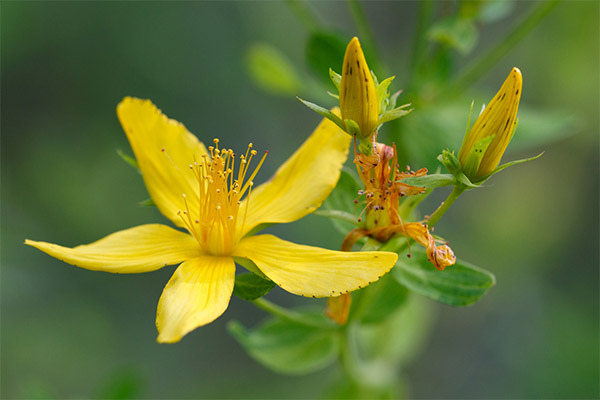
- Myrcene. This substance has the ability to inhibit the growth of E. coli and Pseudomonas coli, which cause dangerous diseases.
- Geraniol. It has a favorable effect on the nervous system. It is thanks to him that the herb is used to destroy staphylococcus, worms and E. coli.
- Cineol. The element has a positive effect on the nervous system. It helps to normalize sleep, get rid of insomnia. St. John's wort is also recommended to patients who are subjected to frequent stress and depression. Cineol also tends to increase the general tone and relieve nervous tension.
- Hypericin. Refers to the unique substances. It activates the growth of new cells and helps to destroy old ones. Thus, the herb has the property to prolong youth.
- Alkaloids. They are used as part of complex therapy, help eliminate neuroses, cope with stress and depression.
- Azulene. This substance has the ability to calm the nervous system. Azulene is also used to accelerate the healing of wounds.
- Saponins. Essential substances for the body. Thanks to their sufficient amount, the risk of developing atherosclerosis is reduced several times. Saponins are also known for their analgesic and diuretic effects.
- Rutin. An essential substance for blood vessels. Rutin has a positive effect, helps to strengthen the vascular walls.
- Hyperoside. The substance helps to stop the inflammatory process, eliminate swelling of tissues. Hyperoside also helps to restore the tone of muscle tissue.
- Vitamin C. In St. John's wort is present in sufficient quantities. The body needs to strengthen its defenses. Thanks to the use of the plant as tinctures and decoctions it is possible not only to avoid the development of colds and other diseases, but also to speed up the recovery process.
- Vitamin P. It is also important for the human body, as it helps to reduce the likelihood of cancerous neoplasms that affect various tissues and organs by several times. Their danger lies in the fact that they can form for a long time without symptoms, and in the later stages, when the signs are manifested, the disease is often already impossible to treat.
St. John's wort also contains B vitamins. They are involved in virtually all processes in the body, have a positive effect on the organs of vision, digestive system, support the normal functioning of the central nervous system, protecting against stress, help strengthen the heart and blood vessels.
Thus, St. John's wort is a unique plant. Its composition contains such substances that are difficult to find in others. That is why it is widely used both in medicine and in cosmetology.
What it looks like and where it grows
St. John's wort is a plant that is perennial. It is capable of reaching 1 m in height. The plant has one, but more often several stems of cylindrical shape with longitudinal ribs, which branch out in the upper part.
Depending on the species, the leaves of St. John's wort are elliptical or oblong. They can be up to 3 cm long and only 1.5 cm wide. Each leaf has veins scattered throughout.
St. John's wort is distinguished by its golden flowers, which are up to 3 cm in diameter. They are gathered in inflorescences and are located at the top of the plant. Each flower has five petals.
Wild St. John's Wort usually grows in temperate regions, but can also be found in the tropics and in the south. The plant is common in the Mediterranean.
Species
Botany today knows about 430 species of St. John's wort. But the most common are:
- Common. It is also called St. John's Wort. It can be found in the northern regions of Africa, Eurasia, the Canary Islands and the Azores, Australia. It is used as a dye in the liquor and food industry, folk and traditional medicine, cosmetology.
- Dye. Grows in Europe, Asia and Africa. Excellent for hedges and adapts well to other plants. Usually used for landscaping.
- Calyx-shaped. Can be found in Greece, Bulgaria and Turkey. Used as an ornamental plant.
- Kamchatka. Received its name as a result of the fact that it is widespread in Kamchatka. It is also found on Sakhalin and the Kuril Islands. It is not used in medicine, but it is actively used in cooking to make delicious and fragrant tea.
- Trifoliate. It grows in Tunisia, Turkey, Cyprus and Malta, and can be found in Jordan and Israel. St. John's wort is actively used in local medicine.
- Spotted. Also a medicinal plant and grows in Europe.
- Mountain. Received its name because it is found mainly in the mountains of the Caucasus. It is found in Europe. Protected in Belarus and Lithuania as an endangered species.
- Olympic. This is an ornamental crop. Olympic Hypericum is found in the Balkans, Syria, Turkey and Greece.
- Extended. Actively used in folk medicine. Also used in industry as a dye.
- Goat's wort. In Israel is considered an endangered species.
The most common are the common St. John's wort and the tetrahedral. They are evergreens and are used as ornamental plants.
Gathering and storage
The herb should be harvested for preserves in the second or third year after sowing. This is when the plant begins to flower actively. Harvesting begins during flowering, around the end of June to early July. But it should only be done in dry weather, cutting only the top 30 cm of the plant. It is better to use a sickle or a fairly sharp knife. The harvested shoots should be dried immediately, as they will begin to rot quite quickly. They are placed in a separate room, necessarily darkened. It is important that there is ventilation, and the temperature in the room does not fall below 50 degrees.
Turn the harvested shoots over regularly so that they dry evenly. Drying can be completed when the leaves begin to crumble and the shoots break easily.
Stored dried St. John's wort in a glass container or cardboard boxes. Storage duration at a temperature of 5 to 25 degrees is three years.
Therapeutic properties of St. John's Wort
Such a plant as St. John's wort, thanks to a number of unique components included in the composition, has been used in folk medicine for more than a century. It has the following medicinal properties:
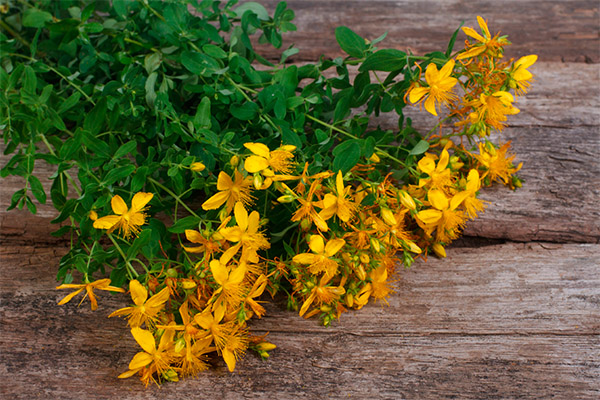
- Antibacterial. Infusions and decoctions are used for diseases caused by various bacteria. The active substances have a negative effect on them, destroying them and slowing the process of their reproduction in the body.
- Sedative. The composition contains a sufficient number of B vitamins and other substances, which have a beneficial effect on the nervous system. St. John's wort is used for stress, psycho-emotional stress and depression.
- Wound healing. Plant is known for its ability to activate the cell regeneration process for burns and wounds, so on the basis of St. John's wort prepare special ointments.
- Painkiller. The remedies prepared on the basis of the plant, perfectly help to cope with pain in the digestive organs, joints, as well as with headaches.
- Diuretic. Plant is known for its properties to withdraw not only the excess moisture, but also to normalize the process of excretion of bile. Thus, the funds on the basis of St. John's wort are actively used to eliminate swelling and biliary excretion disorders.
- Antiseptic. With the help of means on the basis of St. John's wort manages to treat wounds, preventing ingress and spread of infection.
- Anthelmintic. St. John's wort is also actively used as a remedy for worms.
- Antispasmodic. Due to the fact that St. John's wort helps to relieve spasms, it is widely used to treat certain diseases of the gastrointestinal tract.
- Expectorant. Included in the composition of St. John's wort substances help to liquefy and expel phlegm from the bronchi. Therefore, remedies based on the plant are used for colds, flu and other diseases accompanied by the occurrence of coughs.
In addition, all means on the basis of the plant are used to strengthen the cardiovascular system, as a prevention of rheumatism.
For women
St. John's wort has been used for many years as an additional treatment in the presence of gynecological diseases. It significantly reduces pain during menstruation, helps improve the menopause and helps restore hormone levels. The plant has a powerful effect on the female body and is used in the treatment of diseases of the internal genital organs.
St. John's wort also found its application in cosmetology. On its basis, produce a variety of products that help prolong youthfulness of the skin, to eliminate signs of aging, remove fine wrinkles.
For men
It is believed that St. John's wort has the property to increase sexual activity, especially in cases where the cause was stress or constant fatigue.
The plant will benefit the male body, as it helps to reduce the risk of heart disease and vascular disease. According to statistics, men are most susceptible to their development.
In pregnancy
A woman during pregnancy in the presence of certain diseases can not take most medicines, because they can cause harm to the fetus. That's why expectant mothers often resort to folk medicine. Herbs are rarely contraindicated in pregnancy. Usually they are not used in case of allergies.
But it is important to consider that also means of folk medicine can be dangerous during this period. St. John's wort belongs to this group. Despite the fact that it has many useful properties, it is forbidden to use it in its pure form. It is usually used in complex therapy in small amounts.
The plant contains a unique substance hyperin, which helps not only to improve mood, but also to cope with stress. St. John's wort and has a large amount of vitamin C, which is necessary to strengthen and maintain immunity, which is important enough during pregnancy.
But to apply it to future mothers is still not recommended. The thing is that the funds on its basis have the ability to raise blood pressure, which can lead to irreparable consequences. The most dangerous are miscarriages or premature births. Use preparations based on it should be prescribed by a doctor and only in the specified dosages. Most often they are prescribed when the benefits far outweigh the perceived harm.
When breastfeeding
Specialists also do not recommend the use of products based on Hypericum when breastfeeding. This is due to the fact that the constituent substances tend to penetrate into the breast milk and cause harm to the baby.
Thus, when lactating, it is better to refuse to use the plant as a treatment for diseases.
For children
St. John's wort with proper use will benefit the children's body. But it should be given with great caution and only in the specified dosage. Before using it, it is best to consult with your doctor.
The plant will help to support the immune system, especially during the flu and cold season, to eliminate gastrointestinal disorders. St. John's wort also has a positive effect on the child's nervous system. Before using it, make sure that there is no allergic reaction.
When losing weight
In order to reduce weight, many women have already tried many diets and various means. Among them are St. John's Wort. On its basis are prepared decoctions and infusions that help maintain body weight in the normal range. The process of losing weight using the plant occurs by suppressing appetite, reducing stress and normalizing the digestive process.
Many women practice fasting as a means to lose weight. As a result, the body is highly stressed, there is a constant fatigue. Such a diet negatively affects not only the nervous system, but also the state of the digestive organs. St. John's wort will help to relieve unpleasant symptoms and promote weight loss.
St. John's wort oil: properties and use
Oil is prepared from the flowers and stems. It is characterized by a brown color with a red hue and has a light aroma of the plant. The remedy is also used in folk medicine, as the composition contains many useful components. These include vitamins B, C, PP, A and E.
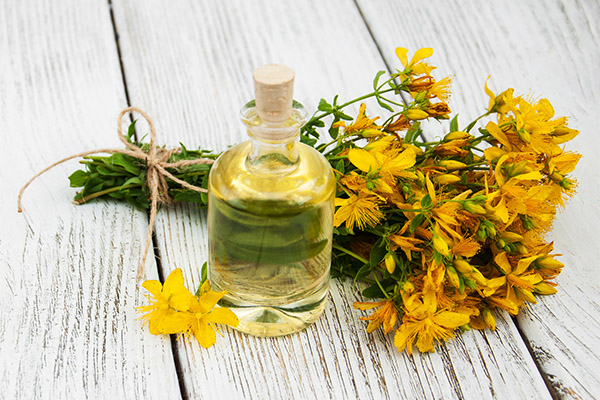
Microelements, which are also included in the oil, are also good for the body. In its properties, it is equal to almond oil. The oil is known for its bactericidal, astringent, and warming properties. It also helps to eliminate pains of different kinds, reduce the risk of atherosclerosis, support the heart, blood vessels, muscle tissue.
In addition, the oil is actively used in folk medicine to relieve spasms, eliminate inflammation and accelerate tissue regeneration after their damage.
Oil prepared on the basis of the plant has a positive effect on the functioning of the kidneys, liver, digestive system. It strengthens the nervous system, eliminates symptoms of allergic reactions to food or cosmetics, is used for gout and rheumatism.
St. John's wort oil is also used to improve the general condition in osteochondrosis, helping to repair damaged tissues and get rid of unpleasant symptoms. It is used for gastritis, ulcers, pustules, burns. The product is actively used in cosmetology for the care of combination and oily skin. It helps to eliminate sebaceous glands, wrinkles and prolong the youthfulness of the skin.
Thus, even the oil prepared on the basis of St. John's wort, when used correctly, will bring invaluable benefits for the body, improve the general condition and get rid of a whole complex of unpleasant signs that occur in certain diseases.
St. John's Wort in medicine
Plant for centuries used by folk healers for the treatment of many diseases. All remedies prepared on the basis of St. John's wort, will have a positive effect on the body.
Diabetes mellitus
The disease is often accompanied by swelling of tissues. St. John's wort will help relieve unpleasant symptoms due to its diuretic properties. Also infusions and decoctions will help restore the work of the gallbladder, support the liver and remove harmful substances from the body. At the same time, they do not affect blood glucose levels.
In pancreatitis
Patients suffering from this disease often suffer from severe pain, which is not only quite intense, but also prolonged. Get rid of them will help St. John's wort, from which special decoctions or infusions are prepared. This is due to the plant's hyperforin composition. This substance helps to eliminate the pain syndrome and improve the overall condition.
In addition, remedies based on Hypericum will get rid of inflammation, which is also often accompanied by a number of unpleasant signs.
Gastritis
Gastritis is a fairly common disease, which is characterized by the emergence of an inflammatory process on the mucous membrane of the stomach. In the case of the development of the pathology, a diet is prescribed, and medications are also prescribed. Also as an additional therapy can be used and tincture based on St. John's wort. It will help to stop inflammation, has an antimicrobial effect.
In addition, the remedy will help to restore microflora and normalize bowel function. With regular use, symptoms disappear after just a few days.
For the intestines
St. John's wort by folk healers is also used for the purpose of normalizing the work of the intestines. With the help of means it is possible to get rid of flatulence, bloating, constipation. Due to its properties and the components included in the plant based infusions are able to cope with intestinal infections. It helps to destroy pathogens and to slow their reproduction.
Also St. John's wort is used to get rid of painful sensations, which can be caused by intestinal disorders, inflammatory processes that lead to the emergence of a number of diseases.
When constipation.
Constipation in the intestines is a common problem, especially in women after pregnancy. Constipation can be caused by an improper diet, a sedentary lifestyle.
To cope with such a delicate problem will help tincture of St. John's wort. The plant has a laxative effect and facilitates the process of excretion of feces. Also, the remedy is recommended as a prevention of the occurrence of stagnation in the intestines.
With gout
The disease is a form of arthritis. It results from the accumulation of salt deposits in the joints. As a result, there is a restriction of their mobility, which is accompanied by pain.
St. John's wort will help you cope with unpleasant symptoms and eliminate inflammation. The plant will help relieve pain, inflammation and reduce the likelihood of complications.
In colitis
The disease is characterized by the development of inflammation on the mucosa of the colon. Pathology in its early stages is accompanied by unpleasant symptoms. Tincture on the basis of St. John's wort will help to cope with them.
The remedy will help to stop the spread of the pathological process, protect the mucosa of the organ from further damage.
For the liver
The liver is exposed to great stress every day. It protects the body from the effects of harmful substances. The use of tinctures and decoctions based on St. John's wort will help to significantly reduce the burden, since the substances included in the plant contribute to the removal of toxins. Thus, St. John's wort is used by folk healers as the prevention of a number of liver diseases, as well as for their therapy.
When hemorrhoids
Sedentary and sedentary lifestyle affects the overall health of the person. One of the diseases, the cause of which is the lack of motor activity, is hemorrhoids. It manifests itself with unpleasant symptoms, accompanied by an inflammatory process. Stop the spread of pathology will help to use means on the basis of St. John's wort. They will also help to relieve a person from painful sensations.
In cholecystitis.
It occurs as a result of inflammation of the gallbladder and is a complication of cholelithiasis, in which solid formations begin to form in the gallbladder and ducts. Everything is accompanied by unpleasant symptoms, especially intense pain.
St. John's wort can also help you get rid of them. The plant, on the basis of which infusions and decoctions are made, contains substances that help not only to stop the inflammatory process and relieve pain, but also to restore the process of bile outflow. This is quite important in the presence of such a disease.
With vitiligo
The disease today is quite common. It is a dermatological disease in which there is a violation of the synthesis of melanin. As a result, the skin acquires a special color. All this leads to the appearance of white spots on the skin. The disease may have varying degrees of severity. Often vitiligo is almost invisible, but in some cases the disorder is visible to the naked eye, as the skin becomes marble-like.
St. John's wort oil is used to eliminate unpleasant signs and restore melanin synthesis. It is used in compresses that are applied to the affected areas of the skin. After a few days, the discolored spots begin to disappear.
Cases of maxillary sinusitis
Schistulitis is a complication of a cold, in which pus begins to accumulate in the sinuses of the nasal cavity. As its amount increases, deterioration of sense of smell, nasal congestion is noted. The soft tissues under the eyes swell up, which over time becomes noticeable to others.
Swelling can also occur in the forehead. All this may be accompanied by fever and other unpleasant symptoms. St. John's wort can help eliminate inflammation and relieve pain. The herb is used as additional therapy and helps to significantly speed up the healing process, reduce the risk of complications.
From alcoholism
Alcohol gradually destroys the body. First of all, the liver and the stomach suffer. Over time, a person becomes addicted to alcoholic beverages, he wants to drink them regularly.
A St. John's wort infusion can help you cope with this dependence. The substances that make up the plant, contribute to the appearance of intolerance to alcohol. St. John's wort for many years already successfully used as a way to get rid of alcohol dependence.
From depression
A depressive state occurs as a result of prolonged stresses to which a person is subjected. It is characterized by depression, irritability, apathy and other signs. Being depressed for a long time negatively affects one's life and therefore requires treatment.
You can get rid of depression not only with the help of medications. For this purpose, you can use St. John's wort based remedies. The plant perfectly helps to restore the psycho-emotional state, to get rid of depression and normalize the nervous system. This property is due to the fact that the composition of St. John's wort contains B vitamins and other substances that have a positive effect on the nervous system.
If you have a cold
Colds often occur in the fall and spring periods. Lack of therapy can lead to the development of diseases such as meningitis, maxillary sinusitis, otitis media and others. Therefore, when there is a runny nose, cough, fever, should immediately begin treatment.
Often a complex of drugs is prescribed. But to speed up the healing process, you can use the means on the basis of St. John's wort. They will help to support the immune system, relieve sore throats, relieve inflammation of mucous membranes, coughs and runny nose.
St. John's wort for colds significantly increases the effectiveness of medicines due to the sufficient content of vitamin C.
At menopause
Menopause is always accompanied by symptoms such as excessive sweating, hot flashes, deterioration of the general condition, the development of depression. Cope with unpleasant symptoms will decoctions prepared from St. John's wort.
The plant contains many substances that help normalize the nervous system, lift your mood and improve your general condition.
Cystitis
The disease occurs with inflammation of the bladder and is accompanied by painful sensations, frequent urges to urination, as well as a violation of this process.
St. John's wort is actively used not only for menopause, but also for gynecological diseases, cystitis. Decoctions and tinctures are used to relieve inflammation, due to which it stops spreading further on the walls of the bladder.
The plant also has an analgesic effect, which contributes to a significant improvement of the condition. Use remedies based on the plant should only be used in conjunction with medications prescribed by your doctor. This will help to get rid of unpleasant signs faster and reduce the likelihood of complications.
From worms
Worm infestation is a fairly common problem. Parasite infestation can occur due to a lack of proper hygiene, as well as after eating fish or meat that is not well cooked. St. John's wort will help to get rid of them, because the plant has a powerful anthelmintic property due to the components included in the composition. Tinctures and decoctions contribute to the destruction of worms and slow down the reproduction process.
St. John's wort increases or decreases the blood pressure.
The question of whether St. John's wort lowers or increases blood pressure, interests many patients who suffer from sharp fluctuations in blood pressure.
All remedies prepared on the basis of the plant have the property of increasing the blood pressure. Therefore, before using any infusions or decoctions, it is important to get advice from a specialist.
As a result of the fact that St. John's wort increases blood pressure, it can not be used during pregnancy. A sharp spike in BP can provoke premature birth or miscarriage.
Types of healing compositions with St. John's wort
On the basis of the useful and healing plant, several types of compositions are prepared. Each of them will bring invaluable benefits for the body when used correctly and will allow to cope with certain diseases. Before using them, it is important to make sure that there is no allergic reaction and other contraindications.
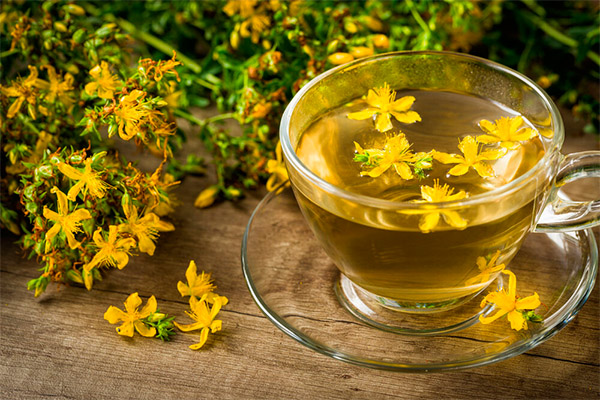
Infusion .
To prepare it is quite simple. To do this, you should take three tablespoons of dried plant. All pour a glass of boiling water. Insist for two hours. After the herb has given up all its taste, smell and useful substances, strain the solution. Take one-third of a cup. Infusion is used for diseases of the gastrointestinal tract, sleep disorders and cystitis.
The remedy perfectly copes with painful sensations, helps to normalize sleep and restore the digestive system organs. After a course of therapy, a significant improvement in condition is noted.
Tincture .
Such a remedy helps with diseases of the mouth, such as stomatitis. It is prepared on the basis of alcohol or vodka. Therefore, children should not be given such a remedy, even though the tincture is also intended for gargling. It is also used for external use to treat wounds, cuts and abrasions.
The tincture can also be used internally. To do this, a few drops of the remedy are diluted in a small amount of water.
Alcohol or vodka is needed for preparation. If vodka is used, take a larger dose. One part of the dried plant should be mixed with 10 parts of alcohol. Insist for 3 weeks, shaking the tincture regularly. At the end of the time, strain the solution with gauze and pour into a container of opaque material, cover with a lid. Leave in a cool place.
Decoction
Dry St. John's wort in the amount of two tablespoons should be poured 250 ml of hot water. Then boil everything on a water bath for half an hour. When the decoction is ready, cool everything and strain. Such a remedy is used for many diseases. It can also be used as a cosmetic for washing or hair. It helps to restore microcirculation, eliminate signs of aging, relieve soreness and inflammation.
Tea
One of the popular remedies based on St. John's wort is tea. It can be used instead of the usual drink. It helps with insomnia, chronic fatigue, depression and stress. The tea will also be beneficial for colds. This is due to the fact that the plant contains a large amount of vitamin C. It will help to strengthen the immune system.
In addition, such a drink eliminates inflammation in the throat and nasopharynx, destroys pathogens, which are the cause of colds and flu.
When making tea, you can add linden, lemon balm or rose hips. They will enhance the therapeutic effect of St. John's wort. To brew the drink, you will need two tablespoons of dried plant and 500 ml of boiling water. All you need to insist. You can add honey to taste.
The drink turns out to be not only useful, but also quite tasty. He will like it adults and children. It is used not only in the period of colds, but also as a preventive measure.
Use in cosmetology
The plant St. John's wort has many useful components, some of which are rare. They all have a beneficial effect on the body.
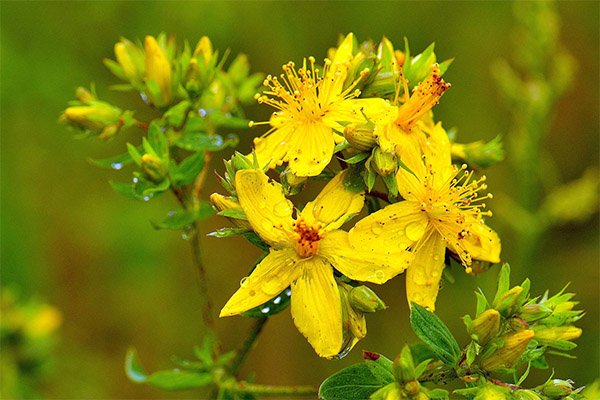
But St. John's wort is used not only to treat a number of diseases, but also in cosmetology. All the means have anti-inflammatory, toning, regenerating and anti-aging properties. With their regular use, it is possible to eliminate the signs of early aging, shallow wrinkles, minor inflammation, acne, acne.
The plant is used in the presence of the following problems:
- Increased oiliness of the skin;
- acne;
- dandruff and hair loss;
- pustules on the skin;
- Cracks on the heels;
- wrinkles and skin aging.
There are many different recipes to help maintain the beauty of your face and hair. The most famous and effective among them are:
Tincture for acne
It is used to wash the face when there are pustular rashes on the skin of the face. It can be used daily. To make it, you need a tablespoon of dried plant and a glass of boiling water. All mixed and infused for 20 minutes. Wash daily in the evening before going to bed. It is not necessary to wipe your face after the procedure, and let the infusion to soak in.
Decoction for oily skin
Oily shine is also a common problem. To restore the sebaceous glands, it is enough to take two large spoons of St. John's wort, pour them with a glass of water and boil. The decoction should cool, after which it should be strained. Soak a cotton disk in the solution and wipe your face. You can use it daily.
Mask from oily shine
Also an effective remedy. To prepare the mask, you need two tablespoons of St. John's wort, pour four spoons of boiling water. Everything should infuse until you get a pulp. Apply it to the skin of the face, leave it for 15 minutes and then wash it off. The product can be used every 3-4 days.
Lotion from wrinkles and signs of aging
For its preparation will require a tablespoon of vodka and a glass of infusion based on St. John's wort. All must be mixed. Rub the lotion on your face after evening washing.
Infusion for hair loss
St. John's wort perfectly copes with hair loss. To prepare the product should take a tablespoon of plants, pour a glass of boiling water and leave everything for 20 minutes. After cooling, strain and take internally before meals twice a day.
Infusion for dandruff
To eliminate such a problem as dandruff, you need to prepare an infusion according to the recipe above. It is used to rinse the hair after washing.
Mask for hair growth
Its regular application will help normalize hair growth, activate dormant bulbs. The result will be noticeable after 2-3 months. To make it, you will need one egg and two large spoons of honey and dried plant each. Melt the honey in a water bath so that it becomes liquid. Boil the plant in 250 ml of boiling water and insist for 20 minutes, then strain. Combine honey with egg yolk, add the infusion and mix everything thoroughly. The product should have the consistency of a balm. The resulting mass is applied to the hair, wrap it in foil and towel, leave it for one hour, then wash off with warm water.
All the recipes have been used in cosmetology for many years. With their help, you can maintain the beauty of the facial skin, prolong youthfulness, get rid of dandruff and hair loss.
Precautions
Before using means based on St. John's wort, you need to know a few key points. It is important to observe the following precautions:
- You should not consume alcoholic beverages or coffee during the treatment period. Such a combination can have a negative effect on the overall condition.
- To achieve good treatment results, you need to give up eating sweets, spicy, smoked and salty foods. Throughout the treatment period, it is very important to adhere to a proper diet, especially in the presence of diseases of the gastrointestinal tract.
- Do not apply the means from St. John's wort if the specialist prescribed antidepressants. The combination of such drugs will have a negative effect on the nervous system, as the herb has a sedative effect. With the simultaneous use of drugs and St. John's wort there is confusion, a feeling of constant anxiety and restlessness, as well as other symptoms.
- Use infusions and decoctions based on St. John's wort should only be used as prescribed, without exceeding the dosage. Excessive use of remedies can lead to bloating and cramps in the organs of the digestive system.
- St. John's wort should be taken with caution with painkillers. This is due to the fact that the plant due to its constituent substances contributes to a long-lasting effect or its elimination.
- The plant should be collected in remote areas, where there are no roads and cars. The fact is that St. John's wort, collected along dusty roads, contains a large amount of cadmium. This substance is dangerous to human health.
It is also important to know that with prolonged use of the plant as a complementary therapy, bitterness in the mouth, constipation and decreased appetite can occur. Therefore, the course of treatment should not be long. If necessary, you need to take breaks for 10-14 days.
Contraindications for use
St. John's wort by folk healers was called a remedy for 99 diseases. The plant has a number of properties that contribute to improving the condition in various diseases. But before you start using St. John's wort, it is important to know when it can not be used. Contraindications and possible side effects are:
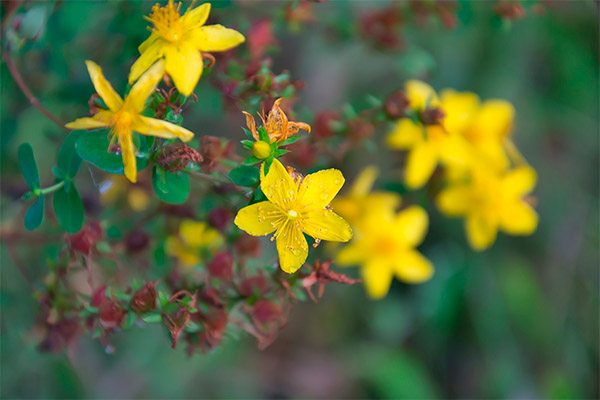
- Photosensitization. The disease is characterized by hypersensitivity of the epidermis to sunlight. Specialists do not recommend staying in the sun for long periods of time during the course of therapy.
- Hypertension. The elements that make up the plant, contribute to the increase in blood pressure. Thus, people who suffer from hypertension, take infusions and decoctions based on St. John's wort without medical advice is contraindicated.
- Previously suffered an intervention for the transplantation of a donor organ. St. John's wort contains special substances that can provoke the process of rejection. Thus, treatment with St. John's wort is prohibited to people who have undergone surgery for organ transplantation.
- Consumption of contraceptives. The plant helps to reduce the effect of contraceptives. That is why you should not use preparations and infusions based on St. John's wort. This can lead to unwanted pregnancy.
- Mental illness. Patients suffering from disorders of the mental state, it is forbidden to treat with St. John's wort. The use of folk medicine remedies based on the plant leads to the development of a manic syndrome.
- Acceptance of antidepressants. Specialists do not recommend the use of preparations and infusions or decoctions of St. John's wort, because their combination causes confusion, sleep disorders, hallucinations, seizures, severe headaches, anxiety. In some cases, coma may occur.
- Taking antibiotics. St. John's wort should not be used with antibiotics as well, because the substances that make up the plant contribute to the rapid excretion of the active components contained in the drugs. As a result, the effectiveness of treatment decreases several times.
- Taking Indinavir for AIDS. St. John's wort should not be used when undergoing treatment for a disease such as AIDS with a drug called "Indinavir". The reason is that the plant several times reduces the concentration of the active substances of the drug in the blood. Thus, the therapy becomes insufficiently effective.
- Acceptance of painkillers. Specialists also do not recommend combining St. John's wort and painkillers. The plant can enhance or weaken their therapeutic effect. Also, if surgery with anesthesia is necessary, it is important to inform the doctor about the use of St. John's wort. Studies have shown that certain components of St. John's wort, when combined with anesthesia, can cause ocular nerve damage.
All products based on Hypericum is not recommended to take during pregnancy and while breastfeeding, since the constituent substances can have a negative impact on the development and formation of the fetus and cause an allergic reaction in the child. If it is necessary to use such remedies, you should consult with a specialist.
It is also important to know that St. John's wort with prolonged use can cause a potency disorder in men. It independently passes after the end of treatment after some time.
Many experts argue that the use of drugs prepared on the basis of St. John's wort, can lead to an increase in liver.
Among the side effects are noted such conditions:
- Allergy. It is expressed in the form of the appearance of rashes on the skin, redness, itching, eczema.
- Headaches of varying intensity.
- Restlessness, anxiety and fatigue.
- Anemia, in which there is a lack of iron in the body.
- Painful sensations in the abdominal area.
- Stool disorders, which is represented by constipation and diarrhea alternating with each other.
- Decreased appetite, as a result of which the person begins to lose weight.
- Bitterness in the mouth.
When such symptoms appear, you should refuse to use decoctions and infusions based on St. John's wort. Many of them go away on their own after their cancellation.
St. John's wort is the most popular herb in folk medicine. It contains substances, most of which are quite unique. The plant helps to restore the work of almost all systems of the body and is used to treat certain diseases. To achieve the best effect, it is necessary to observe all precautions, properly prepare and take decoctions, tinctures, oil and tea.
«Important: All information on this site is provided for informational purposes only. purposes. Consult with your health care professional before applying any recommendations. professional before using them. Neither the editors nor the authors shall be liable for any possible harm caused by materials."

